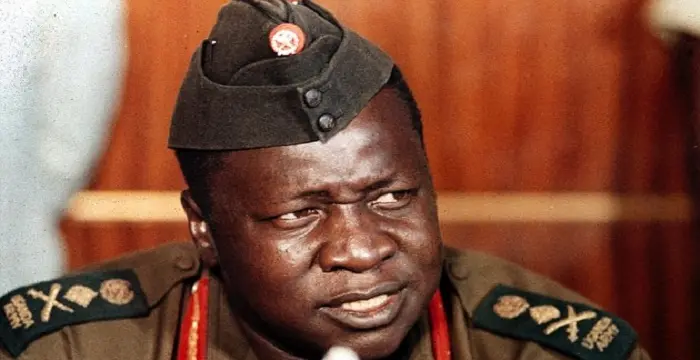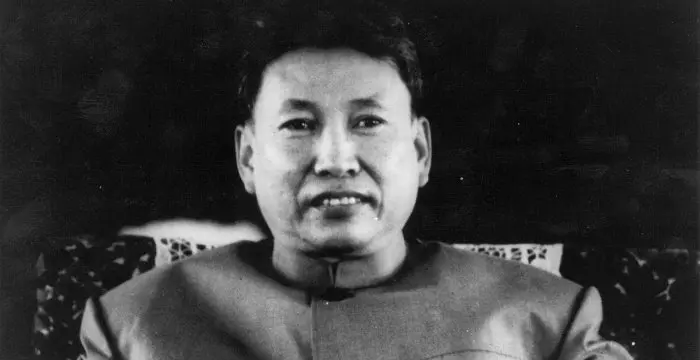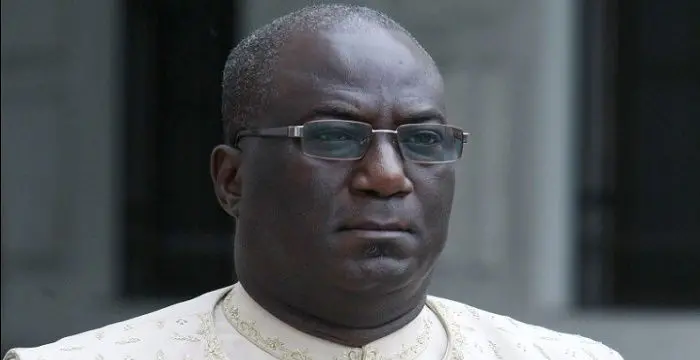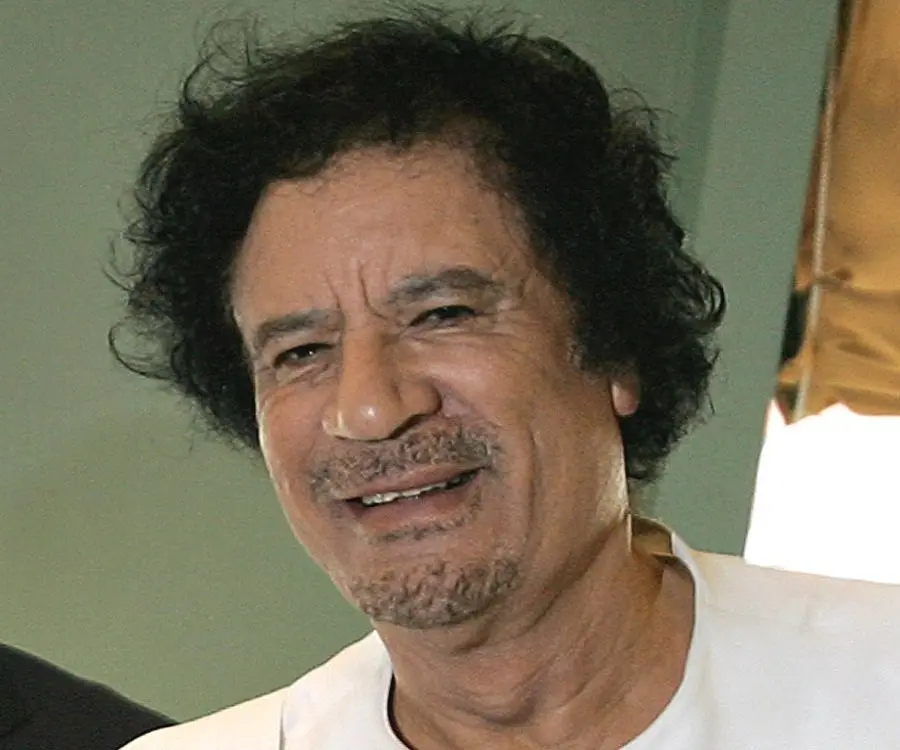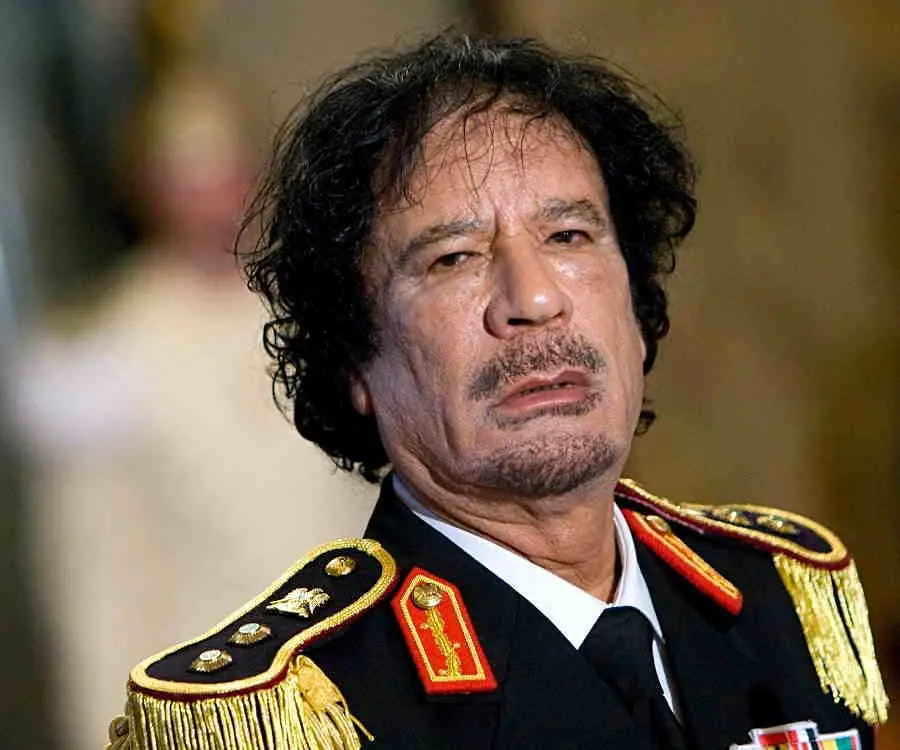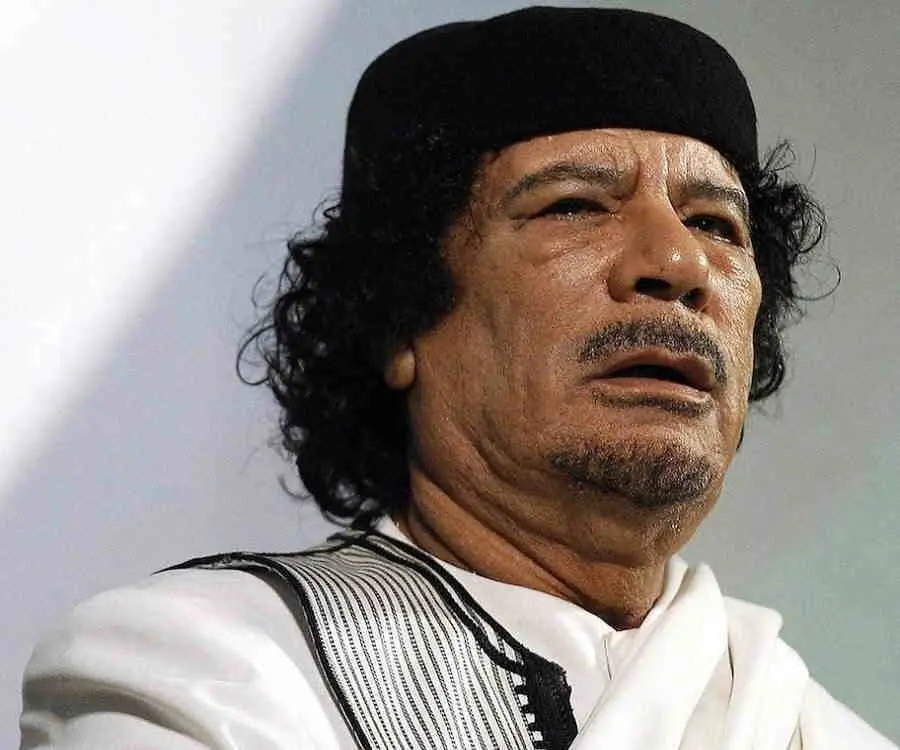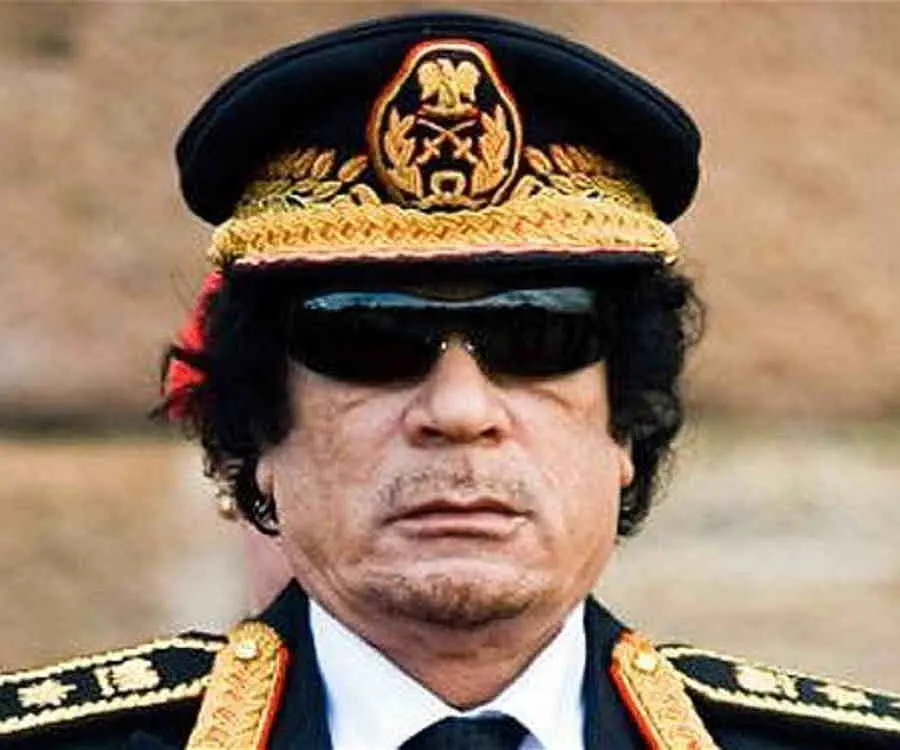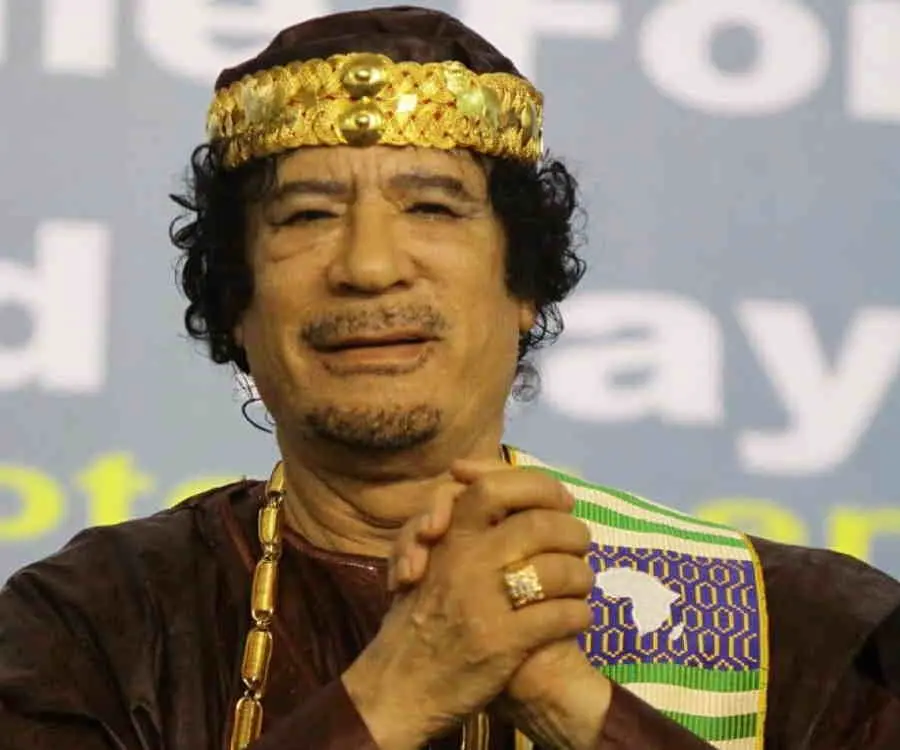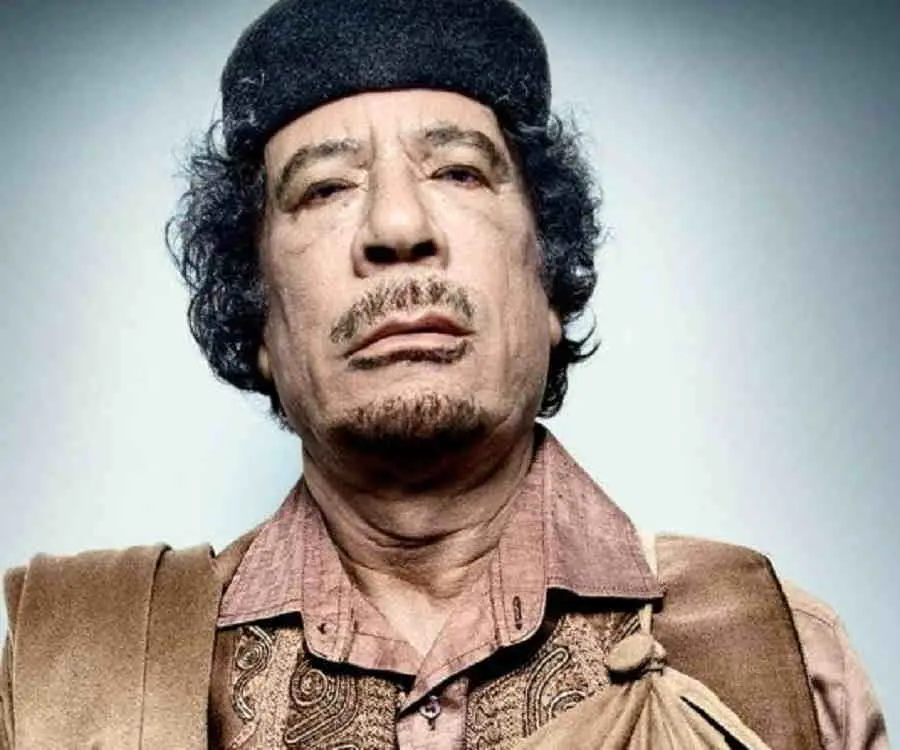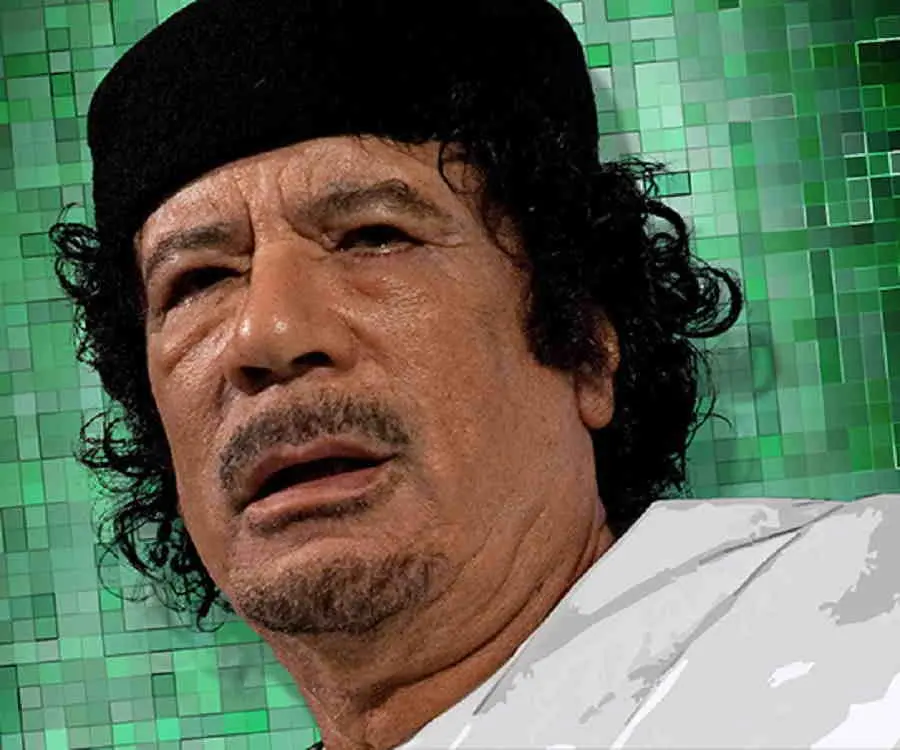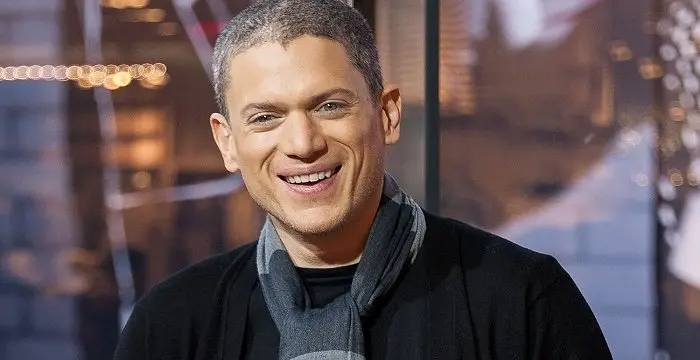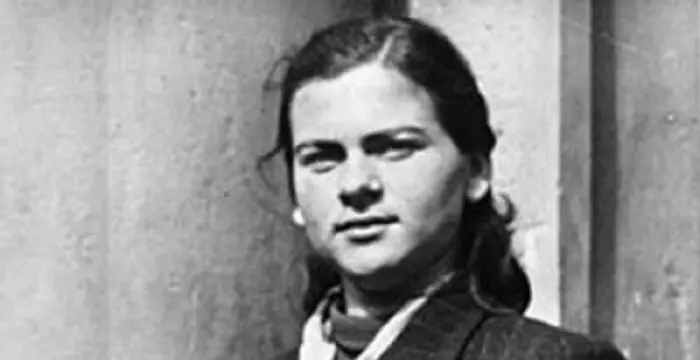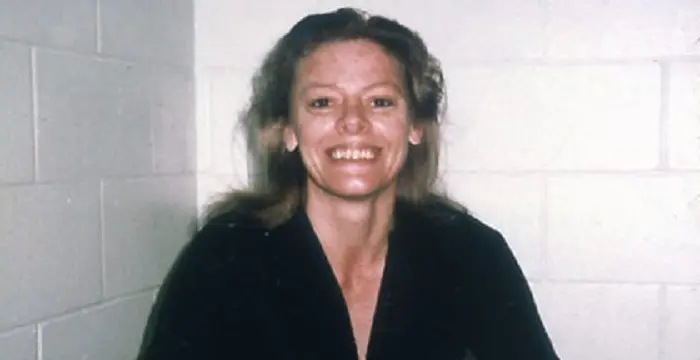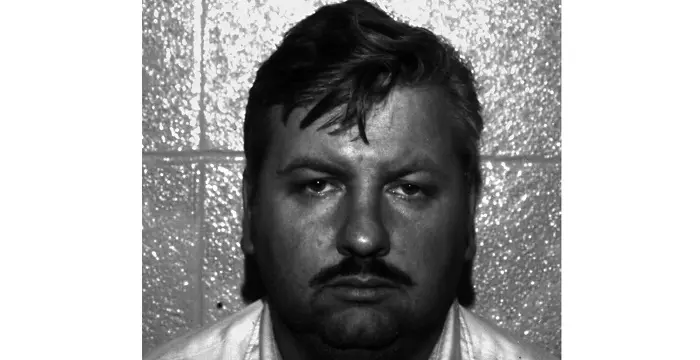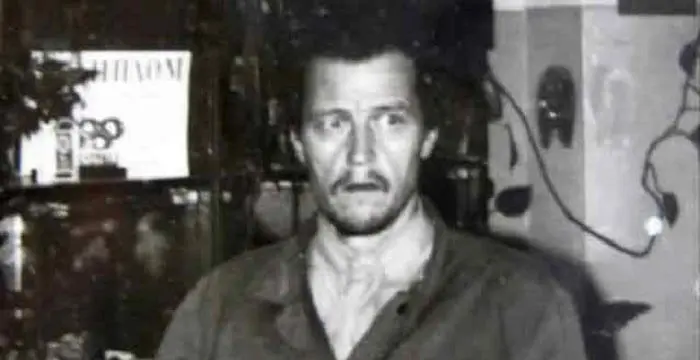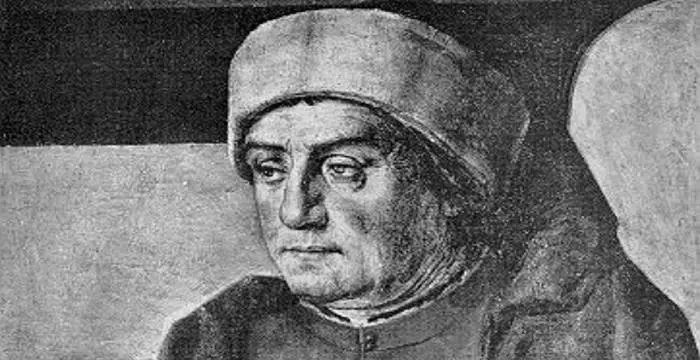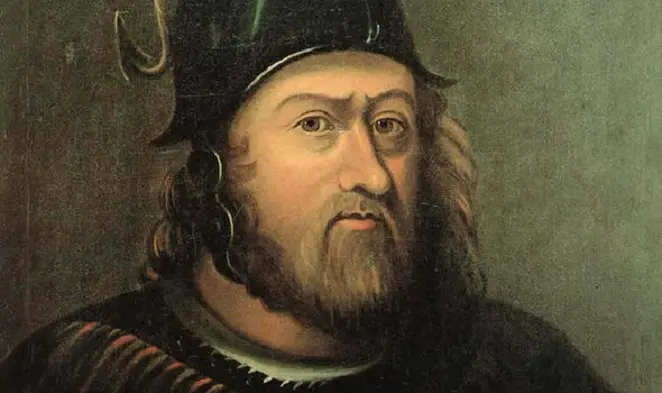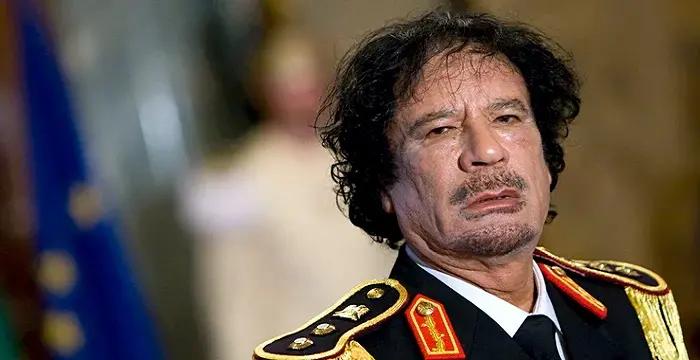
Muammar Gaddafi - Dictators, Life Achievements and Life
Muammar Gaddafi's Personal Details
Muammar Gaddafi was a dictator and autocrat who ruled Libya for 42 years
| Information | Detail |
|---|---|
| Birthday | June 7, 1942 |
| Died on | October 20, 2011 |
| Nationality | Libyan |
| Famous | Leaders, Dictators |
| Spouses | Fatiha al-Nuri (m. 1969–1970), Safia Farkash (m. 1970–2011) |
| Known as | Colonel Gaddafi, Muammar Gaddafi |
| Childrens | Al-Saadi Qadhafi, Ayesha Gaddafi, Hannibal Muammar Gaddafi, Khamis Gaddafi, Moatassem-Billah Gaddafi, Muhammad Gaddafi, Saif al-Arab al-Gaddafi, Saif al-Islam Gaddafi |
| Universities |
|
| Cause of death |
|
| Birth Place | Qasr Abu Hadi |
| Political Ideology | Arab Socialist Union (1971–1977) |
| Religion | Islam |
| Gender | Male |
| Father | Abu Meniar |
| Mother | Aisha |
| Sun Sign | Gemini |
| Born in | Qasr Abu Hadi |
| Died at Age | 69 |
// Famous Dictators
Idi Amin
A Ugandan dictator, Idi Amin is remembered for his brutal regime and crime against humanity. Check this biography to know in details about his life, childhood, profile and timeline.
Pol Pot
Pol Pot was the Cambodian revolutionary who led the Khmer Rouge. This biography provides a glimpse of his childhood, career, profile and timeline.
Siaka Stevens
Siaka Stevens was the third Prime Minister of Sierra Leone who later became the first President of the country. This biography of Siaka Stevens provides detailed information about his childhood, life, achievements, works & timeline.
Muammar Gaddafi's photo
Who is Muammar Gaddafi?
Popularly known as the dictator of Libya, Muammar Gaddafi was a revolutionary leader and politician who took control of the reins of the country for 42 years. In his four decades of being in power, he brought several changes in the Libyan government, first serving as the Revolutionary Chairman of the Libyan Arab Republic from 1969 to 1977 and later switching to serve as the ‘Brother Leader’ of the Great Socialist People's Libyan Arab Jamahiriya from 1977 to 2011. He adopted various beliefs, first as Arab nationalist to supporting Arab socialist and finally his own ideology of Third International Theory. It is interesting to note that despite of coming from a poor and underprivileged family, he showed traits of being a revolutionary since an early age. He created a revolutionary cell in the military which assisted in seizing power from King Idris in a bloodless coup. Over his years of dictatorship, he condemned international relations with western countries and broke diplomatic ties with several others thereby establishing a reputation of Libya as an ‘international pariah’. It was due to his increased dominance, his support for international terrorism and violation of human rights of Libyan citizens that led to a mass revolt which eventually resulted in the formation of National Transitional Council, the dethronement and finally the end of Gaddafi. To know in details about his life, read further.
// Famous Leaders
Edi Rama
Edi Rama is the current Prime Minister of Albania. Check out this biography to know about his childhood, life, achievements, works & timeline.
Tecumseh
Tecumseh was a Native American leader of the Shawnee clan. This biography profiles his childhood, life and timeline.
Khalifa bin Zayed Al Nahyan
Sheikh Khalifa bin Zayed Al Nahyan is the current President of the United Arab Emirates (UAE). Check out this biography to know about his birthday, childhood, family life, achievements and fun facts about him.
Childhood & Early Life
Muammar Gaddafi was born to Abu Meniar and Aisha in an inconsequential tribal family of al-Qadhadhfa. Much of his early years were spent in Sirte, which was a desert region in Western Libya. He had three elder sisters.
Born in an Italy occupied Libya, he witnessed the country gain independence in 1951. Since an early age, he was influenced by the Arab nationalist movement and had grown a fancy for Egyptian leader Gamal Abdel Nasser, which later was prominent in his revolutionary tactics.
Academically, he achieved his preliminary education from a local elementary school after which the family moved to Sabha for better educational opportunities. However, his involvement in the protest against Syria’s secession from United Arab Republic led to the family relocation to Misrata.
In 1963, he enrolled at the University of Libya in Benghazi to study history but dropped out of the same to join military. He trained himself at the Royal Military Academy.
Reckoning British as imperialists and publically announcing his insurrection against everything English, he commissioned a Central Committee of the Free Officers Movement in 1964.
Later Life
Graduating from the Academy in 1965, he took up the post of a communications officer in the army's signal corps. He moved to United Kingdom for further military training, attaining which, he returned to Libya
Meanwhile, King Idris’ popularity sharply declined in the country through the latter half of the 1960s. Not only did the level of corruption increase with the exploitation of the oil wealth, but the Idris-led government was seen as a pro-Israeli one.
As such, in 1969, when Idris travelled to Turkey and Greece for summer vacations, Gaddafi’s Free Officers Movement capitalized on the opportunity and launched ‘Operation Jerusalem’ with a motive to overthrow the government.
Meeting little resistance, he abolished the monarchy to form Libyan Arab Republic. He claimed to bring an end to the corrupt practices and establish massive change in the social, economic and political arena of the country.
He formed a 12-member Revolutionary Command Council (RCC) which was Libya’s new ruling body and declared himself as its Chairman. Subsequently, he became the de-facto head of the states as well. He appointed himself as the Colonel and took on the post of Commander-in-Chief of the armed forces.
During his early days of power, he brought about numerous changes in the social and the economic front, starting off by increasing the price of Libyan oil. This was after he realized that the reigning terms and conditions were benefitting for the foreign countries rather than Libyan state.
An increase in the price of oil acted favourably for the country and brought about increased revenue with greater state control. He even announced the nationalization of active foreign oil producers in Libya. This move proved to be an economic success, with elevated per-capita income and GDP.
Additionally, he ordered the shutting down of the American and British military bases in Libya and the replacement of Gregorian calendar with the Islamic one. He even forbade the sale of alcohol in the country.
In 1970, he expelled the last few Italians who had remained in the country with a quest to launch Arab nationalism against British or more appropriately Western imperialism. He even removed the Jewish community from Libya.
Meanwhile, he strengthened Libya’s relationship with France and Soviet Union, purchasing weapons from the latter, which directly affected the country’s relations with US. The gap further widened when he supported the Palestinians in the Israeli-Palestinian conflict.
For waging war against the Israeli’s, who were in turn supported by US, he administered the founding of Jihad Fund and First Nasserite Volunteers Centre. He supported various militant groups across the world, encouraging their revolutionary activities and liberation struggles and rebuffing off any proclamation of them as ‘terrorists’.
He gained help from Arab nationalist regimes in Egypt, Syria, Iraq and Sudan who immediately recognized the influence of Naseer’s Arab nationalism in Libya. In 1972, his Pan-Arab ideas which called for a political federation however did not realise on account of the radical Libyan policies
In 1973, he came up with the Third Universal Theory, which rejected the imperialism practiced by the western states and communist powers and instead advocated nationalism, leading to the creation of Islamic and Third Worlds against imperialism. He based his ideology on Islam and the teachings of the Quran.
From 1975 until 1978, he came up with three short volumes of Third Universal Theory which was collectively published as The Green Book. The book provided a detailed explanation of his political philosophies. It threw light on the problems faced by liberal democracy and capitalism and promoted his policies as a redeeming factor.
The continuous expenditure of oil revenues on foreign causes led to a widespread contention among the public who launched several attacks on him and RCC leaders. This caused unrest in the country as political prisoners were put to death.
Towards the end of the 1970s, he involved the Libyan military in several foreign conflicts, including in Egypt and Sudan, and the bloody civil war in Chad. In 1977, he dissolved the Libyan Arab Republic to form the Great Socialist People's Libyan Arab Jamahiriya.
In 1978, he stepped down as the Secretary General of GPC but continued his service as the Commander in Chief. The government then moved towards socialism and paid much emphasis on equality. This raised alarm for the government as many turned critical of it.
The beginning of the 1980s spelled economic disaster for Libya as oil revenues dropped considerably. Worsening the economic damage was spoiled relations with other foreign countries.
In 1981, the US President Ronald Reagan called him ‘International pariah’ and ‘mad dog of the Middle East’. Reagan further reduced the involvement of US embassy workers and companies to diminish their operation in Libya to zero.
By 1984, UK too broke off its diplomatic ties with the Libya. The US bombing of 1986 further increased his reputation as an anti-imperialist both domestically and across the Arab world.
The period between 1987 and 1998 was a revolution within a revolution. It witnessed various economic and military reforms including establishment of small business and reform in industry and agriculture sector. Meanwhile, popular militia replaced army and police. Several failed coup attempts were made but he escaped all of them.
The dawn of the 20th century witnessed his rejection of Pan-Arab nationalism and adoption of Pan Africanism. He further initiated in developing ties with UK and US. Relations with China, North Korea and European Union also improved
His improved relations with the US did not bring an end to his anti-western rhetoric as he called for anti-imperialism front across Africa along with Hugo Chavez. On the economic front, he increased privatization much against the policies advocated in his Green Book.
With the commencement of the Arab Springs which resulted in the forceful exit of dictators and rulers from the Arab states, he grew wary of it as demonstrations, riots and protests broke throughout Libya.
Though he used aggressive force to curtail the riots, the violence only infuriated the public who became even more determined to oust Gaddafi from the ruling position. They formed National Transitional Council which attained support from NATO.
The military intervention of NATO saw the rebels winning over the region of Tripoli, which was his largely supported domain. This brought a symbolic end to his rule. Warrants against him were issued while NTC became the legitimate governing body of Libya.
Personal Life & Legacy
He married twice in his lifetime. His first wife, Fatiha al-Nuri bore him a son in 1970 before parting ways with him the same year. Subsequently, he married Safia Farkash. The couple was blessed with seven children.
In 2011, after the takeover of Tripoli, he moved to Sirte and proposed to negotiate with the National Transitional Council (NTC) but in vain. He travelled from one residence to the other to escape death.
There is no proper evidence as to what caused or who led to his death as the information available is varied and contradictory. On October 20, 2011, Gaddafi broke out of Sirte's District 2 in a joint civilian-military convoy, hoping to take refuge in the Jarref Valley. As per Official NTC accounts Gaddafi was caught in a cross-fire and died from his bullet wounds. In the aftermath of his death, he was buried at an unidentified location in the desert.
// Famous Gemini Celebrities peoples
Wentworth Miller
Wentworth Miller is an American actor and screenwriter who achieved recognition for his role in the TV series ‘Prison Break’.
Joyce Meyer
Joyce Meyer is a Christian author and speaker. This biography provides detailed information about her childhood, life, achievements, works & timeline
Zoe LaVerne
Zoe LaVerne is an American musical.ly star. Check out this biography to know more about her family, personal life, including her age, birthday, etc.
Muammar Gaddafi's awards
| Year | Name | Award |
|---|---|---|
Other | ||
| 0 | - Order of Courage | |
| 0 | - Order of the Jihad | |
| 0 | - Order of the Grand Conqueror | |
| 0 | - Order of the Republic | |
| 0 | - Al-Fatah Medal | |
| 0 | - National Commemorative Medal of Malta | |
| 0 | 1997 - Order of Good Hope | |
| 0 | 1971 - Wissam al-Jihad Order of Holy War | |
| 0 | - Order of the Yugoslav Star | |
Muammar Gaddafi biography timelines
- // 7th Jun 1942Muammar Gaddafi was born to Abu Meniar and Aisha in an inconsequential tribal family of al-Qadhadhfa. Much of his early years were spent in Sirte, which was a desert region in Western Libya. He had three elder sisters.
- // 1951Born in an Italy occupied Libya, he witnessed the country gain independence in 1951. Since an early age, he was influenced by the Arab nationalist movement and had grown a fancy for Egyptian leader Gamal Abdel Nasser, which later was prominent in his revolutionary tactics.
- // 1963In 1963, he enrolled at the University of Libya in Benghazi to study history but dropped out of the same to join military. He trained himself at the Royal Military Academy.
- // 1964Reckoning British as imperialists and publically announcing his insurrection against everything English, he commissioned a Central Committee of the Free Officers Movement in 1964.
- // 1965Graduating from the Academy in 1965, he took up the post of a communications officer in the army's signal corps. He moved to United Kingdom for further military training, attaining which, he returned to Libya
- // 1969As such, in 1969, when Idris travelled to Turkey and Greece for summer vacations, Gaddafi’s Free Officers Movement capitalized on the opportunity and launched ‘Operation Jerusalem’ with a motive to overthrow the government.
- // 1970In 1970, he expelled the last few Italians who had remained in the country with a quest to launch Arab nationalism against British or more appropriately Western imperialism. He even removed the Jewish community from Libya.
- // 1970He married twice in his lifetime. His first wife, Fatiha al-Nuri bore him a son in 1970 before parting ways with him the same year. Subsequently, he married Safia Farkash. The couple was blessed with seven children.
- // 1972He gained help from Arab nationalist regimes in Egypt, Syria, Iraq and Sudan who immediately recognized the influence of Naseer’s Arab nationalism in Libya. In 1972, his Pan-Arab ideas which called for a political federation however did not realise on account of the radical Libyan policies
- // 1973In 1973, he came up with the Third Universal Theory, which rejected the imperialism practiced by the western states and communist powers and instead advocated nationalism, leading to the creation of Islamic and Third Worlds against imperialism. He based his ideology on Islam and the teachings of the Quran.
- // 1975 To 1978From 1975 until 1978, he came up with three short volumes of Third Universal Theory which was collectively published as The Green Book. The book provided a detailed explanation of his political philosophies. It threw light on the problems faced by liberal democracy and capitalism and promoted his policies as a redeeming factor.
- // 1977Towards the end of the 1970s, he involved the Libyan military in several foreign conflicts, including in Egypt and Sudan, and the bloody civil war in Chad. In 1977, he dissolved the Libyan Arab Republic to form the Great Socialist People's Libyan Arab Jamahiriya.
- // 1978In 1978, he stepped down as the Secretary General of GPC but continued his service as the Commander in Chief. The government then moved towards socialism and paid much emphasis on equality. This raised alarm for the government as many turned critical of it.
- // 1978In 1981, the US President Ronald Reagan called him ‘International pariah’ and ‘mad dog of the Middle East’. Reagan further reduced the involvement of US embassy workers and companies to diminish their operation in Libya to zero.
- // 1984By 1984, UK too broke off its diplomatic ties with the Libya. The US bombing of 1986 further increased his reputation as an anti-imperialist both domestically and across the Arab world.
- // 1987 To 1988The period between 1987 and 1998 was a revolution within a revolution. It witnessed various economic and military reforms including establishment of small business and reform in industry and agriculture sector. Meanwhile, popular militia replaced army and police. Several failed coup attempts were made but he escaped all of them.
- // 2011In 2011, after the takeover of Tripoli, he moved to Sirte and proposed to negotiate with the National Transitional Council (NTC) but in vain. He travelled from one residence to the other to escape death.
- // 20th Oct 2011There is no proper evidence as to what caused or who led to his death as the information available is varied and contradictory. On October 20, 2011, Gaddafi broke out of Sirte's District 2 in a joint civilian-military convoy, hoping to take refuge in the Jarref Valley. As per Official NTC accounts Gaddafi was caught in a cross-fire and died from his bullet wounds. In the aftermath of his death, he was buried at an unidentified location in the desert.
// Famous Execution peoples
Irma Grese
Irma Grese was a notorious German Nazi concentration camp guard during the Second World War. This biography profiles her childhood, life, horrifying acts, death and other facts.
Aileen Wuornos
Aileen Wuornos was a serial killer who was sentenced to death for killing seven men in Florida. This biography of Aileen Wuornos provides detailed information about her childhood, life, crimes & timeline.
John Wayne Gacy
John Wayne Gacy was an American serial killer and rapist who targeted boys and young men. This biography of John Wayne Gacy provides detailed information about his childhood, life, achievements, works & timeline.
Anatoly Slivko
Anatoly Slivko was a Soviet serial killer. Check out this biography to know about his childhood, life, crimes and other facts about him.
Anicius Manlius Severinus Boethius
Boethius was an early 6th century Roman senator and philosopher best known for his treatise ‘Consolation of Philosophy’. This biography of Boethius provides detailed information about his childhood, life, achievements, works & timeline.
William Wallace
William Wallace was a Scottish knight who was a central figure in the Wars of Scottish Independence. This biography of William Wallace provides detailed information about his childhood, life, achievements, works & timeline.
Muammar Gaddafi's FAQ
What is Muammar Gaddafi birthday?
Muammar Gaddafi was born at 1942-06-07
When was Muammar Gaddafi died?
Muammar Gaddafi was died at 2011-10-20
Which age was Muammar Gaddafi died?
Muammar Gaddafi was died at age 69
Where is Muammar Gaddafi's birth place?
Muammar Gaddafi was born in Qasr Abu Hadi
What is Muammar Gaddafi nationalities?
Muammar Gaddafi's nationalities is Libyan
Who is Muammar Gaddafi spouses?
Muammar Gaddafi's spouses is Fatiha al-Nuri (m. 1969–1970), Safia Farkash (m. 1970–2011)
Who is Muammar Gaddafi childrens?
Muammar Gaddafi's childrens is Al-Saadi Qadhafi, Ayesha Gaddafi, Hannibal Muammar Gaddafi, Khamis Gaddafi, Moatassem-Billah Gaddafi, Muhammad Gaddafi, Saif al-Arab al-Gaddafi, Saif al-Islam Gaddafi
What was Muammar Gaddafi universities?
Muammar Gaddafi studied at Joint Services Command and Staff College, Benghazi Military University Academy
What is Muammar Gaddafi's cause of dead?
Muammar Gaddafi dead because of Execution
What is Muammar Gaddafi's political ideology?
Muammar Gaddafi's political ideology is Arab Socialist Union (1971–1977)
What is Muammar Gaddafi's religion?
Muammar Gaddafi's religion is Islam
Who is Muammar Gaddafi's father?
Muammar Gaddafi's father is Abu Meniar
Who is Muammar Gaddafi's mother?
Muammar Gaddafi's mother is Aisha
What is Muammar Gaddafi's sun sign?
Muammar Gaddafi is Gemini
